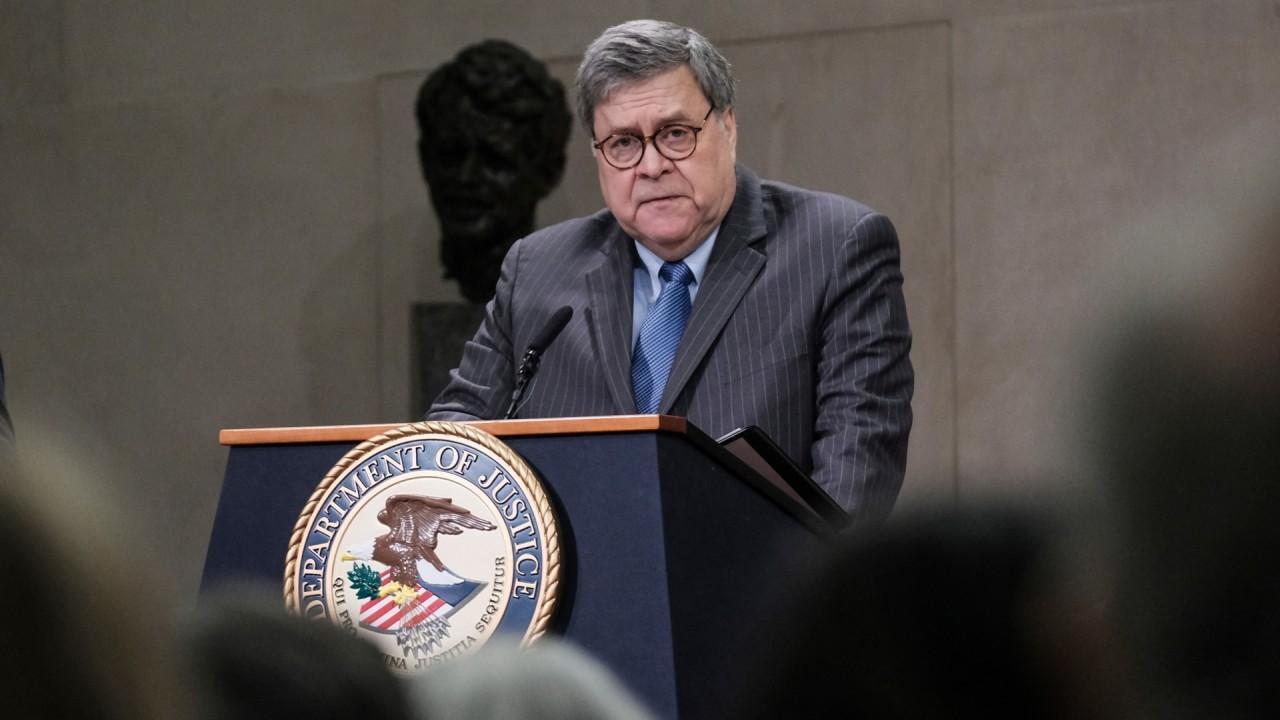AG Barr targets encryption again at human trafficking summit
Attorney General William Barr took another shot at encryption and its role in helping criminals remain untraceable during the White House Summit on Human Trafficking on Friday.
Barr's comments came after he and the FBI were scrutinized by tech experts earlier in January for requesting something of an exclusive government key to encrypted iPhones to speed up criminal investigations -- a request some experts said could actually put U.S. national security at risk.
"We live in a digital age, and like everyone else, human traffickers are relying increasingly on digital communication and the internet ... and more and more, the evidence we rely on to detect and to deal with these predators is digital evidence," Barr said. "However, increasingly, this evidence is being encrypted."
EXPERTS SAY IPHONES ARE EASY TO UNLOCK, SO WHY IS THE FBI DEMANDING APPLE'S HELP?
"We all recognize that encryption is important in the commercial world to protect consumers like us from cybercriminals, but now, we're seeing military-grade encryption being marketed on consumer products like cellphones and social media platforms and messaging services, and that means that we cannot get access to this data," Barr said.

Attorney General William Barr reacts as he appears before a Senate Appropriations subcommittee to make his Justice Department budget request, Wednesday, April 10, 2019, in Washington. (AP Photo/Andrew Harnik)
Apple products and Facebook messenger apps, for example, offer end-to-end, or very strong, encryption so that the product designers themselves cannot immediately access their customer's devices and messages. The purpose of this strong encryption is to meet consumer demand for privacy.
"We just can't have chatrooms and websites that are involved in grooming children victims or selling trafficked women -- sites that are impenetrable to law enforcement -- and we have to do something about this," Barr said.
Gab.com, an online encrypted chatroom that does not allow and actively polices criminal content, condemned Barr's statements on Twitter and said the best way to stop human trafficking would be to regulate porn and "build the wall."
"[If] Barr wants to crack down on human trafficking he should go after the porn industry, not encryption," the website wrote, adding in a second tweet, "The best way to fight human trafficking is to go after the porn industry and build the wall. Full stop."
Barr and Sen. Lindsey Graham (R-S.C.) are also targetting encryption with a new draft bill called the "Eliminating Abusive and Rampant Neglect of Interactive Technologies (or EARN IT) Act," Bloomberg reported Thursday.
APPLE, FACEBOOK DEFEND ENCRYPTION UNDER GRILLING FROM SENATORS, LAW ENFORCEMENT
The bill would take away some Section 230 protections from websites if users post child exploitation content. The intentions of the draft bill are obviously good, but it would also require companies like Facebook to allow backdoor government access to encrypted information, which experts say will just cause more trouble, because if the good guys have backdoor access, the bad guys will eventually figure it out, too.
"The issue AG Barr has with encryption is that tech companies which use cryptography that they themselves cannot break ... do so in order to protect their users from third party attackers, including themselves," Gab CEO Andrew Torba said in a statement to FOX Business that was later posted on Twitter. "Encryption ... creates a private space for conversation much as a walk through the park would have been a hundred years ago, or a shredded letter 50 years ago."
"Apart from being an unconstitutional infringement of the First Amendment rights of tech companies and their users, this law will destroy the US tech industry, or drive it offshore, if passed. The bill should be scrapped," Torba added.
Riana Pfefferkorn, a member of the Stanford Law School’s Center for Internet and Society, wrote of similar concerns to the constitutional rights of online communication platforms and their users in a substantial critique of the bill.
"While the EARN IT Act is ostensibly aimed at Section 230, it’s actually a sneaky way of affecting [encyption laws] without directly amending it," Pfefferkorn wrote. "This bill has a number of extremely serious problems, too many to fit into one blog post. It is potentially unconstitutional under the First, Fourth, and Fifth Amendments, for one thing."
CLICK HERE TO READ MORE ON FOX BUSINESS
Tech expert and Johns Hopkins professor Matthew Green also condemned the bill and Barr's motivation behind the legislation on Twitter.
"I am deeply skeptical of Barr’s motivation here. After several years of opposing encryption on very different grounds (criminals, terrorists) and asking for access only with a warrant, suddenly making a hard right turn and saying 'think about the children' — feels cynical," he wrote.
Andrew Garrett, CEO of the computer forensic firm Garrett Discovery, previously told FOX Business that the U.S. government could easily contact professional encryption-breaking companies to crack criminal cases rather than ask for its own backdoor to encrypted devices and websites, which he described as "an easy button."
With backdoor access, the government could continue to access data on encrypted devices and websites without having to contact third-party help and pay large fees. Some experts argue, however, that giving the government a backdoor would unquestionably enable bad actors to have that same backdoor, and the reason companies like Apple provide strong encryption without a golden key is to avoid this kind of event from happening.
GET FOX BUSINESS ON THE GO BY CLICKING HERE
Barr's comments at the human trafficking summit appeared to help his argument against encrypted devices and websites resurface.
This article has been updated to include comments from Gab CEO Andrew Torba.




















